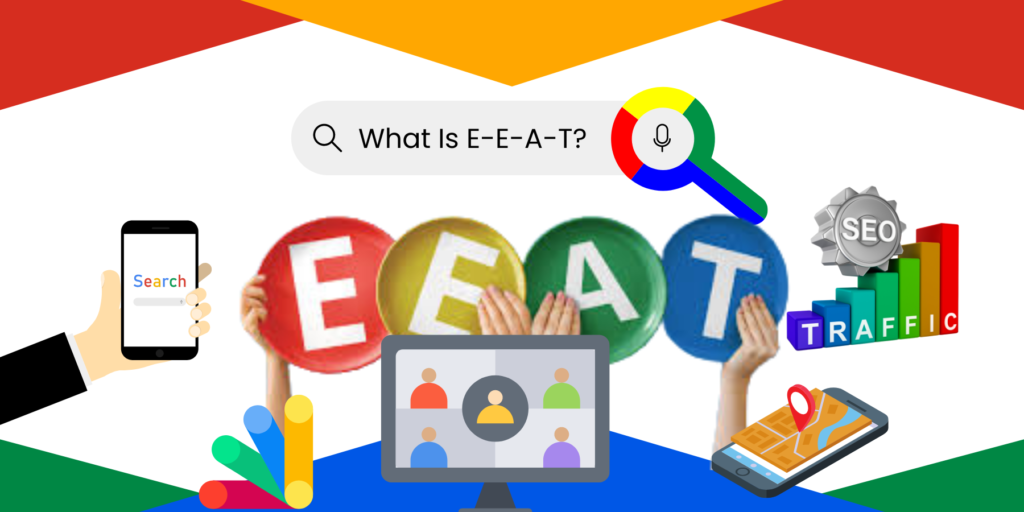Learn how E-E-A-T—Experience, Expertise, Authoritativeness, Trustworthiness—plays a crucial role in Google’s ranking algorithm. Discover why mastering these concepts is essential in digital marketing courses and how they can help your content stand out.
Introduction
In the ever-evolving world of digital marketing, staying ahead of the curve requires more than just understanding basic SEO tactics. Google’s search algorithm has become increasingly sophisticated, placing significant emphasis on what it terms E-E-A-T—Experience, Expertise, Authoritativeness, and Trustworthiness. These factors are critical in determining how well your content ranks on search engine results pages (SERPs). For digital marketers, mastering E-E-A-T is not just an option; it’s a necessity. This blog will delve into the importance of E-E-A-T, how it influences Google’s ranking algorithm, and why it should be a key component of any digital marketing course.
What is E-E-A-T?
E-E-A-T stands for Experience, Expertise, Authoritativeness, and Trustworthiness. These four elements are essential criteria that Google uses to evaluate the quality and relevance of content on a webpage. Understanding and implementing E-E-A-T principles can significantly impact your content’s visibility, credibility, and ranking on Google.

1. Experience
- Definition: Experience refers to the firsthand knowledge or practical experience of the content creator on the subject matter.
- Importance: Google values content created by individuals who have direct, real-world experience with the topic. This factor is particularly crucial for content that deals with complex, technical, or highly specialized subjects.
- Example: A blog post on medical advice written by a practicing doctor would rank higher in terms of experience than one written by a general writer.
2. Expertise
- Definition: Expertise involves the depth of knowledge and skill a content creator possesses in a particular field.
- Importance: Google prioritizes content created by experts, especially in niches like finance, health, and legal advice, where accurate information is critical.
- Example: An article on investment strategies written by a certified financial planner would be considered more expert than one written by a casual blogger.
3. Authoritativeness
- Definition: Authoritativeness measures the reputation of the content creator or the website hosting the content.
- Importance: Google looks at how other websites and users view the content creator’s authority. Backlinks from reputable sites and mentions in industry publications can enhance a website’s authoritativeness.
- Example: A website like the Mayo Clinic, known for its medical expertise, will have high authoritativeness in the healthcare field.
4. Trustworthiness
- Definition: Trustworthiness assesses the reliability and integrity of the content and the site where it’s published.
- Importance: Google values content that users can trust, particularly when it comes to sensitive topics like news, health, and finance. Ensuring your site has clear contact information, an SSL certificate, and transparent business practices can enhance trustworthiness.
- Example: A site with a clear privacy policy, secure payment options, and verified reviews will rank higher in trustworthiness.
The Role of E-E-A-T in Google’s Ranking Algorithm
Google’s algorithm is designed to provide users with the most relevant and high-quality content. E-E-A-T is a framework that helps Google assess whether content meets the needs of its users. When your content aligns with E-E-A-T principles, it’s more likely to rank higher in SERPs, leading to increased visibility and credibility.
How E-E-A-T Impacts SEO
- Quality Content: High-quality content that reflects experience, expertise, authoritativeness, and trustworthiness is more likely to rank well.
- User Engagement: Content that aligns with E-E-A-T principles tends to be more engaging, leading to higher click-through rates, longer dwell times, and lower bounce rates.
- Backlinks and Mentions: Authoritative and trustworthy content is more likely to earn backlinks from reputable sites, which is a key ranking factor in Google’s algorithm.
- Brand Reputation: Adhering to E-E-A-T guidelines can enhance your brand’s reputation, which in turn boosts your site’s overall SEO performance.
Why Digital Marketing Courses Should Teach E-E-A-T
For digital marketers, understanding E-E-A-T is essential. Incorporating E-E-A-T principles into content creation and SEO strategies can significantly improve your site’s performance. This is why any comprehensive digital marketing course should include a deep dive into E-E-A-T.
Key Areas to Focus on in Digital Marketing Courses
- Content Creation with E-E-A-T in Mind
- Learn how to produce content that reflects experience and expertise.
- Understand the importance of authoritativeness and how to build it through quality backlinks and citations.
- Focus on building trust through transparent and reliable content.
- SEO Strategies that Align with E-E-A-T
- Optimize on-page SEO with E-E-A-T principles, including proper keyword placement and meta descriptions.
- Learn how to enhance off-page SEO by building authoritative backlinks and earning mentions from reputable sources.
- Explore how to audit and improve your site’s trustworthiness, such as by enhancing site security and transparency.
- Practical Applications of E-E-A-T
- Case studies of successful E-E-A-T implementations in various industries.
- Hands-on projects that involve creating E-E-A-T-compliant content.
- Tools and resources for monitoring and improving E-E-A-T metrics on your site.

Implementing E-E-A-T in Your Content Strategy
To effectively incorporate E-E-A-T into your content strategy, follow these steps:
- Conduct a Content Audit: Assess your existing content to ensure it meets E-E-A-T standards. Identify areas where you can improve experience, expertise, authoritativeness, and trustworthiness.
- Enhance Author Profiles: Showcase the credentials and experience of your content creators. Include author bios, credentials, and links to social profiles.
- Build Authoritative Backlinks: Focus on earning backlinks from reputable sites within your industry. This will enhance your content’s authoritativeness.
- Boost Site Security: Ensure your site is secure by implementing SSL certificates and following best practices for online privacy and security.
- Create High-Quality Content: Invest time in creating detailed, accurate, and well-researched content that reflects deep knowledge and understanding of the subject matter.
Internal and External Resources
- Compalgo Labs: Learn more about how our digital marketing courses can help you master E-E-A-T and other essential SEO strategies.
- Google Search Central: Explore Google’s official guidelines on creating high-quality content.
- Moz’s Guide to E-E-A-T: A comprehensive guide to understanding and implementing E-E-A-T in your SEO strategy.
Conclusion
E-E-A-T—Experience, Expertise, Authoritativeness, Trustworthiness—forms the cornerstone of Google’s ranking algorithm. Understanding and implementing these principles is crucial for creating content that not only ranks well but also resonates with your audience. For digital marketers, mastering E-E-A-T should be a top priority, and any robust digital marketing course should emphasize these concepts. By aligning your content strategy with E-E-A-T, you can enhance your site’s visibility, credibility, and overall SEO performance.
Ready to Learn Digital Marketing?
Are you ready to take your digital marketing skills to the next level? Join Compalgo Labs today and learn how to create E-E-A-T-compliant content that stands out in search engine results. Elevate your career with the expertise that sets you apart!




